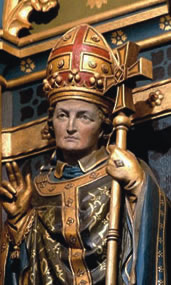March Saints
 Saint Angela of the Cross Gonzales (1846-1932)
Saint Angela of the Cross Gonzales (1846-1932)
María de Los Ángeles Guerrero Gonzáles was born on 30 January 1846 and given the name ‘Maria of the Angels.’ Her parents both worked in the convent of the Trinitarian Fathers. Angelita was greatly influenced by the teaching and example of her pious parents and early on learned to say the Rosary. She could often be found in the parish church praying before an image of Our Lady of Good Health while her mother prepared a nearby altar.
The child made her first Holy Communion at age eight, and was confirmed a year later. She had little formal education, beginning work as a young girl in a shoe shop, where her boss, a holy woman, led her charges in prayer and spiritual reading daily. When she was sixteen, Angelita met Canon José Torres Padilla, a recognised ‘nurturer of saints,’ and was put under his direction.
Angelita felt a desire to enter religious life but was refused admission to the Discalced Carmelites because of her poor health. Instead, she began caring for destitute cholera patients, victims of a current epidemic. In 1868, she tried again to become a religious, this time with the Daughters of Charity. Again her health was against her. She left during the novitiate and returned to the shoe shop.
In 1871, Angelita made a private vow to live the evangelical counsels and, two years later, received a call from God which would mark the beginning of her new ‘mission.’ During prayer, she saw an empty cross standing directly in front of the one on which Jesus was hanging. She understood immediately that God was asking her to hang from the empty cross, to be ‘poor with the poor in order to bring them to Christ.’
While she continued to work in the shoe shop, Angelita wrote a detailed spiritual diary revealing the style and ideal of life she felt she was being called to live. In 1875 three other women joined her, beginning a community life together in a rented room. These Sisters of the Company of the Cross, under Angelita’s guidance, lived an authentically reclusive contemplative life when they were not among the poor. Once they returned to their home, they dedicated themselves to prayer and silence, but were always ready, like angels, to go out and serve the poor and dying.
During her life, several convents were established, with the Sisters edifying everyone by their example of charity, poverty and humility. Mother Angela, known as “Mother of the Poor,” died on 2 March 1932.
Saint Angela, show us how to live simply.
(Source: Internet – various)
 Saints Perpetua & Felicity (d.203)
Saints Perpetua & Felicity (d.203)
Saints Perpetua and Felicity were among a group of martyrs put to death during the reign of Emperor Septimus Severus.
Perpetua was probably a young married noblewoman and Felicity most likely a slave. With a number of catechumens and their teacher Saturus, the two were arrested by authorities in Carthage, North Africa and, save for Saturus who died in the prison, they were torn to pieces by wild animals in the local amphitheatre.
The Acts of these martyrs, describing their deaths, are of considerable value to historians owing to their authenticity. Perpetua and Felicity are mentioned in the First Eucharistic Prayer of the Roman rite.
Saints Perpetua and Felicity, give us the strength to offer our lives to God.
(Encyclopedia of the Saints, Matthew, Margaret & Stephen Bunson.1998 Our Sunday Visitor Publishing, Indiana)
Saint Wulfram, Bishop of Sens, missionary in Frisi, was born at Milly near Fontainebleau, probably during the reign of Clovis II. His father Fulbert stood high in the esteem of Dagobert I and Clovis II. Wulfram received a good education, and was ordained priest.
He intended to spend a secluded life but was called to the Court of Theodoric III of Neustria and from there was elevated to the episcopacy of Sens, replacing the rightful bishop who was then in exile. He was present at an assembly of bishops in 693 at Valenciennes.
Two years later he resigned and retired to the Abbey of Fontanelle. During the second journey of St. Boniface to Rome, Wulfram is said to have preached in Frisia. With a group of monks, he converted many Frisians. He tried to convert the ruler Radbod but, not succeeding, he returned to Fontanelle, where he died.
Saint Wulfram, help us to spread the good news of the gospel to others.
(Source: http://www.newadvent.org/cathen/15716a.htm)

 Entries(RSS)
Entries(RSS)